

 The Accurate Reloading Forums
The Accurate Reloading Forums  THE ACCURATE RELOADING.COM FORUMS
THE ACCURATE RELOADING.COM FORUMS  Hunting
Hunting  African Big Game Hunting
African Big Game Hunting  Cape Buffalo Wounded and Lost: CSI Tanzania
Cape Buffalo Wounded and Lost: CSI TanzaniaGo  | New  | Find  | Notify  | Tools  | Reply  |  |
| One of Us |
[QUOTE]Originally posted by RIP: Shack, I prefer a tree rest to shooting sticks, with my hat between my hand and the tree. QUOTE] I agree that a treee is better, they're just so damned tiring to carry around all day! | |||
|
| one of us |
Thanks for the further good cheer from John S retreever Canuck Surestrike ... "Next time, always next time ..." Warrior, You only add contrast to Gerard, that makes him look like a genius, and you an "ignoranus." Gerard, Please accept my apologies for the blubbering and grasping at straws for any excuses I could imagineer. Your interpretation of the crime scene evidence seems objective indeed. It is well reasoned, and the best explanation of what happened, despite your bullets being involved. Thanks for the shot-placement illustrations accompanying the explanation. My recollection of how the buffalo reacted (to be released on video by Saeed someday) would indeed indicate he got a superficial wound on his brisket/dewlap or a leg. A grazing wound at a low level is the only possibility to explain the evidence, all things considered. My apologies again. Your .510/450-grain HV will become another "African Sheep Rifle" bullet, for plains game out to 300 yards. I can jack the velocity back up to 2835 fps, and use the screw-on muzzle brake if my shoulder gets tender. I have killed bison and cape buffalo previously with your FN solid bullets, you linked my old reports on those kills. I have also killed bison and water buffalo with North Fork and Barnes-X soft points. I will refrain from shooting buffalo through the humerus with any soft point bullet henceforth. That requires an FN solid, just like elephant brain shooting. Correction on your typo/transposition, Gerard? My .510-cal/450-grain HV bullets are only 1.280" long. The ratio of length to caliber is 2.51, not 2.72, unless you have completely redesigned the bullet? Nose hole: I will not batter the nose of any HV in the magazine box. Nevermore. I will keep the box filled with FN solids, and the HV on top of box or in chamber. I will get the HV-hollowpoint to shoot 2.5" to 3" high at 100yards, and get the FN solids of whatever weight and velocity to shoot dead-on at 100 yards. A comparison of the GSC HV nose hole to the Walterhog nose hole will be interesting ... reverse engineering the Walterhog, coming up ... | |||
|
| Moderator |
I thought it might be interesting to note that Don_G had similar trouble with a premium bullet striking cape buffalo humerus on our trip in 2006. He shot a buffalo at something less than 100 yds IIRC, with his 416 Rem Mag and 370 gr North Fork softs. His first shot was "on the point of the shoulder" and the bullet disintegrated. He had a problem immediately after that first shot involving mis-fires and an AD due to a corroded bolt, and all that lead to a long chase over hill and dale. Don posted a very informative post on it back then. Anyhoo, buffalo humeruses and/or shoulder joints seem to be rather tough on boolitz. I think a solid would be the best choice in that instance. | |||
|
| one of us |
Walterhog .375-cal./300-grain monometal copper hollow point soft: One specimen actual weight on my scales = 300.6 grains (moly coated) Bullet length = 1.555" Driving band diameter = 0.375" Inter-band diameter = 0.365" Hollow point nose hole depth = 0.625" Outer hole opening (Chamfered with about 60-degree cone angle?) diameter = 0.15" Inner/deep hole diameter = 0.100" Saeed says he does no scribing of the nose, just CNC drills the holes, but the Walterhog has a tendency to produce 4 petals. GSC .510-cal./450-grain HV, monometal copper hollowpoint soft; One bullet selected at random, actual weight on my scales = 450.0 grains Bullets recovered from cape buffalo: #1: Nose plugged with bone and bent, weight = 449.5 grains. #2: Perfectly expanded and cleaned, weight = 448.6 grains = 99.69%. Expanded diameter = 1.032". Bullet length: 1.280" Driving band diameter: sized by me from .512" to .510" using a Lee cast bullet sizing die. Inter-band diameter = 0.497" Hollow point depth = 0.700" Nose hole diameter = 0.120" 3 petals produced on expansion. Method unknown. | |||
|
| Moderator |
That Walterhog is a lot of calibre lengths long. | |||
|
| Administrator |
A few years ago, I shot a abull broadside, at less than 200 yards away. He ran a few yards and then stopped. Seems to be having great difficulty walking. I shot him again in the head, dropping him. We found that my first shot hit him at the point of the shoulder. We were surprised that the bullet did not exit, so a full autopsy was performed in the field. His shoulder bones were turned into wet sand like mess. The bullet never made into the chest cavity. But, because of the extensive damage to his shoulder bones, he was not able to walk, and we were able to finish him off within a few yards of where he was shot. I will find which video it is and link it for you here. The only conclusion we could gather was that this failure occured because of a fault in the material. We use normal, 100% copper, for our bullets. These rods are meant to be used for earthing electrical connections. While making bullets, I find that some rods have very small cavities in them. We normally can pick these out quite easily. If one looks at the end of the rod, one normally can see a small rust spot in the middle of it. Sometimes, we only find that the bullets have some faults after we make them. Our bullets are made to weigh 300 grains. We cannot keep to this with all rods we get, as some seem to be more dense than others. So each time we use a new rod - rods come in 4 meter lengths, and we cut them to about 60cm to feed through the machine. We weight each bullet as it comes out of the machine. Variations that amount to less than 0.2 of a grain between bullets made from teh same rod are fine. Any variatiuon that goes from 0.5 of a grain to above, the bullet is suspect, and we only use that one for plinking here in our range. Some rods produce bullets that might weight 299 grains. Some rods might produce bullets that might go as higfh as 305 grains. Both are perfectly good to use for hunting. What we also do is segregate our bullets into lots, with a variation of less that one grain in weight, and box them. Together with their weight written on the3 box. Any time we shoot these bullets, whether for sighting in or for a hunt, we make sure that all bullets used fall within 1 grain or less in weight. Going back to the failure. We think the fault in the copper - which is not possible to detect by sight or weight, causes the copper to be very brittle, and it shatters into pieces. A couple of years earlier I shot a buffalo walking at about 200 yards. He ran a few yards and dropped. We found the bullet under the skin on the opposite side, and the bullet did not look normal at all. Again, I will find a photo of that bullet to demonstrate what I am saying. | |||
|
| one of us |
Very interesting ... pending further developments, some eye candy for reverse engineers: 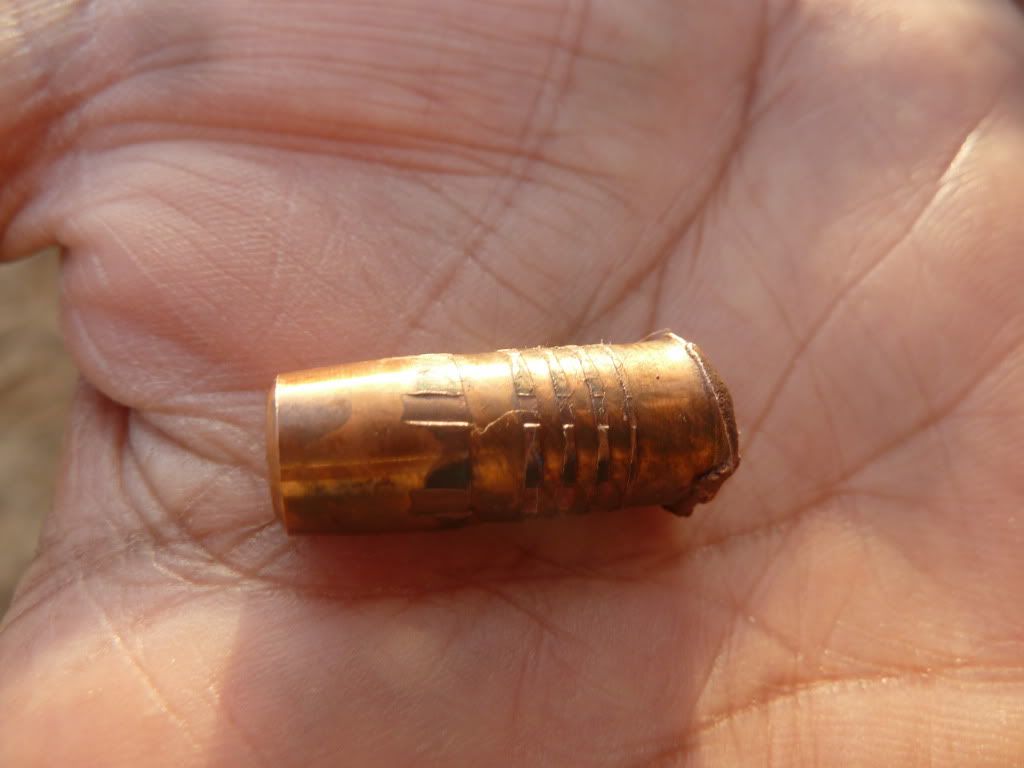 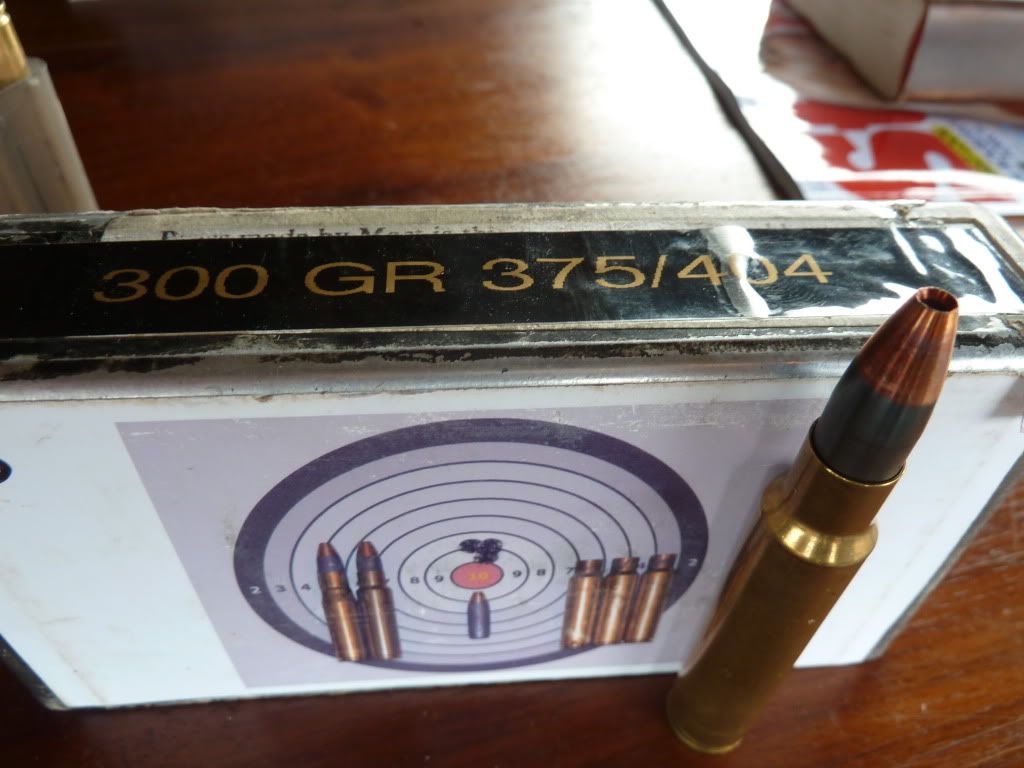 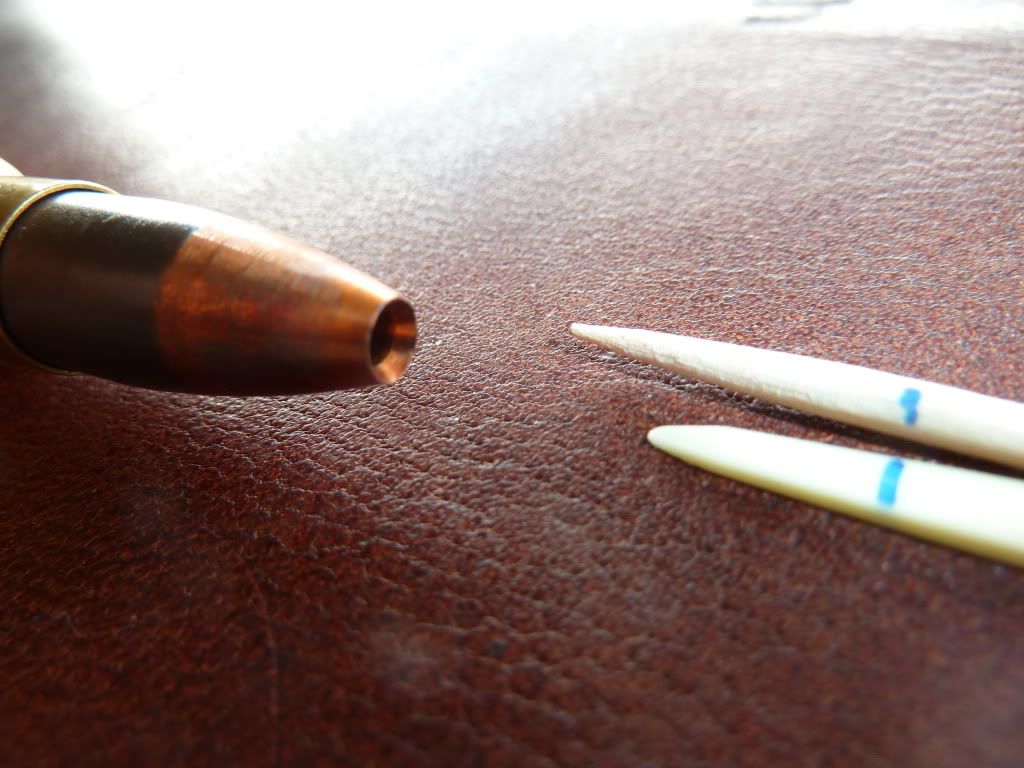 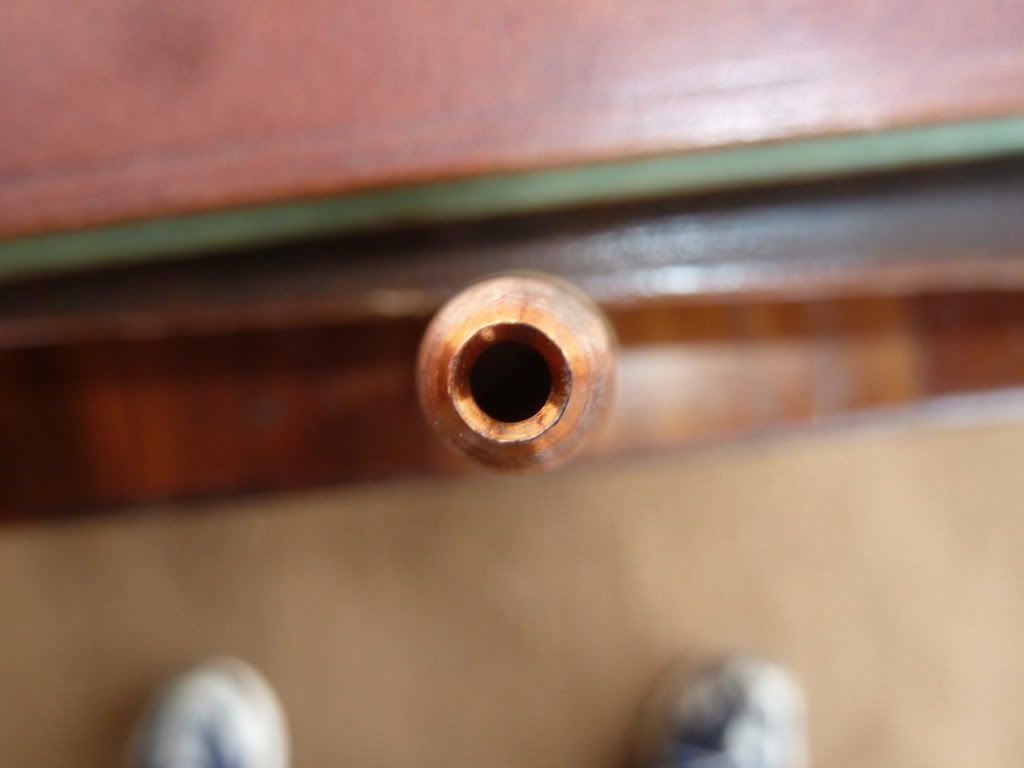 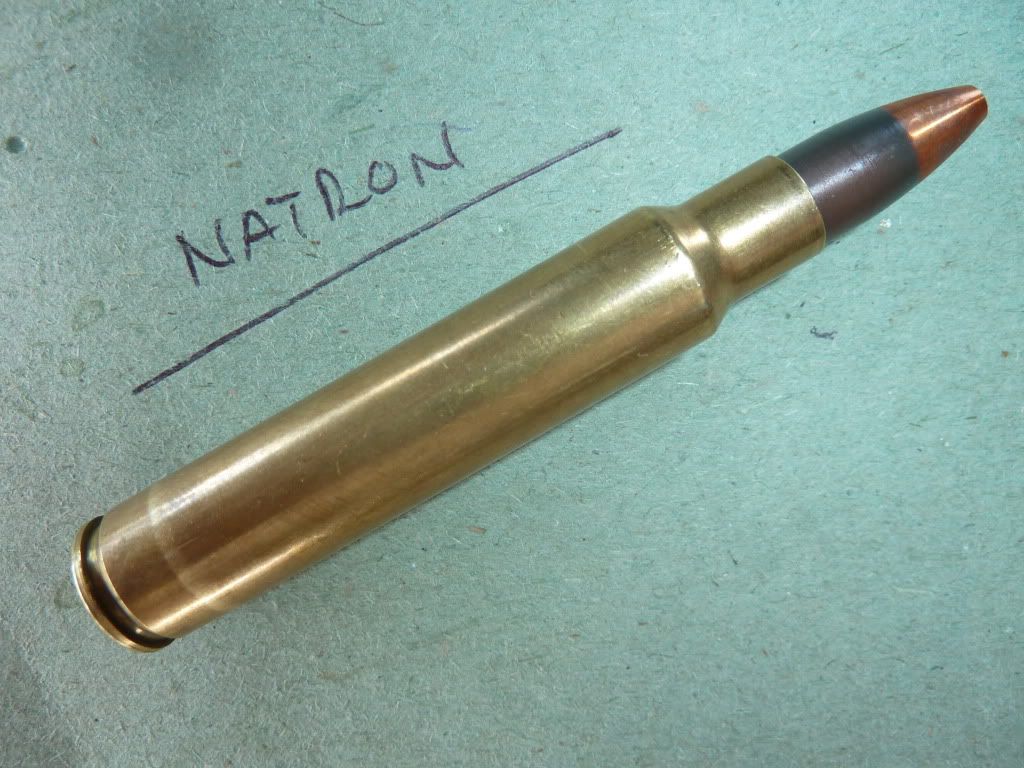 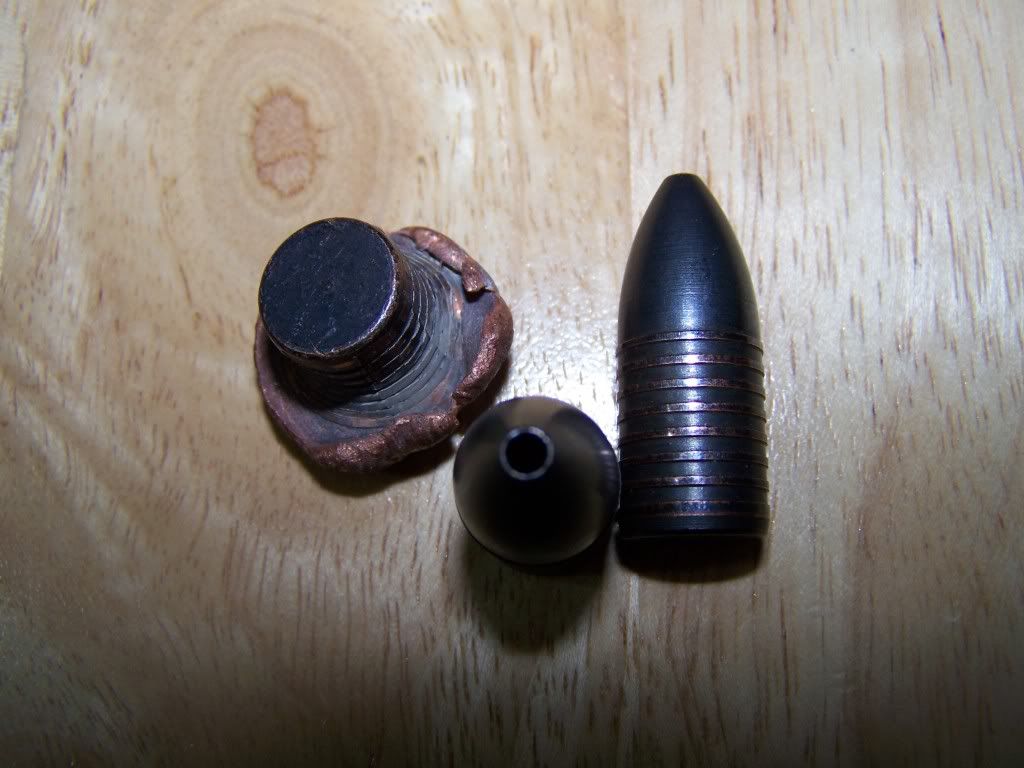 | |||
|
| one of us |
RIP, All is well that ends well. Some bits of information: The 510540FN is 2.68 calibers long. This is purposely given to further confuse Pignoranus. The 510450HV has been redone. Good catch. It is longer than your version with the addition of a boattail and a secant ogive. This results in a considerable forwards shift in cog. BC and frangibilty of the nose is up. I did this when I added the 650gr HV for the 50BMG. The learning curve never flattens.  Don't be too concerned about magazine nose damage. There is a fair amount of redundancy built in there as well. Shoot a damaged and undamaged HV into water and see. | |||
|
| Moderator |
RIP, Sorry to hear about the woulded/lost buff, but I think Gerard nailed the likely cause ie a deflection off the breast bone in the brisket area. Re the sticks, I have to say the ones used looked pretty piss poor; personally I'd have been tempted to ditch that third flapping leg and use it as a bipod.. Looking at the pic of you holding the rifle in the sticks, one suggestion I have is to get the fore end further forward in the V...The point of support acts like a pivot, and further ahead of that pivot the muzzle is, the more it tends to swing about...In effect, a small movement of the stock at the shoulder is "amplified" at the muzzle. I use tall telescopic bipod sticks for all my deer stalking and the above tip made a vast improvement in the accuracy I could achieve using them.. Regards, Peter | |||
|
| one of us |
Thanks for the pointers. Pete E's last suggestion was taken under advisement. Great to relive the misadventure. Rip ... | |||
|
| Powered by Social Strata | Page 1 2 |
| Please Wait. Your request is being processed... |
|
 The Accurate Reloading Forums
The Accurate Reloading Forums  THE ACCURATE RELOADING.COM FORUMS
THE ACCURATE RELOADING.COM FORUMS  Hunting
Hunting  African Big Game Hunting
African Big Game Hunting  Cape Buffalo Wounded and Lost: CSI Tanzania
Cape Buffalo Wounded and Lost: CSI Tanzania

Visit our on-line store for AR Memorabilia

